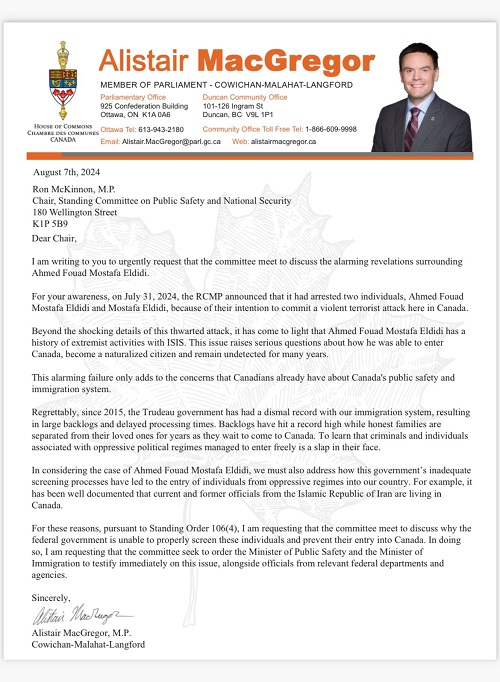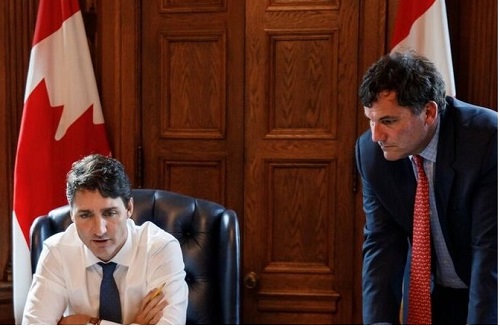“Who gave citizenship to a terrorist?” …the paradoxes of the Canadian immigration system
TORONTO – It is increasingly clear that the immigration system in Canada not only does not work, but even seems to favor the entry of people with disturbing pasts and bad intentions to the detriment of people with a clear past, an employment contract and a great desire of working. News events say so.
Like the recent one, of the three Indians arrested on charges of killing Hardeep Singh Nijjar, 45 years-old, murdered in June 2023 outside a Sikh temple in Surrey, British Columbia: one of the three who ended up in prison had obtained the ” Visa” in record time (despite posting photos of weapons of war on Facebook) and even boasted of it… (re-read our article here: Visa in record time for one of Nijjar’s alleged killers).
Or like the new one, of two Iraqis arrested a few days ago in Richmond Hill on suspicion of planning “a violent terrorist attack in Toronto” on behalf of the Islamic State of Iraq and the Levant, an organization they allegedly have been part for some time. The two are Ahmed Fouad Mostafa Eldidi, 62 years old, and his son Mostafa Eldidi, 26 years old: the father obtained Canadian citizenship a few years ago, the latter has not yet. And the question that, once again, arises spontaneously is: how did the 62-year-old first obtain permanent residency and then Canadian citizenship, given his (apparently very clear) ties to a terrorist organization?
Public Safety Minister Dominic LeBlanc is trying to answer the question, saying that “federal departments are examining how two men with suspected links to a terrorist group abroad were admitted to Canada”.
The charges leveled against the two are, moreover, very serious: they are in fact – as reported by The Canadian Press – nine different charges of terrorism, including criminal conspiracy to commit murders on behalf of the terrorist group Islamic State of Iraq and the Levant. The RCMP had said the two men were “in the advanced stages of planning a serious and violent attack in Toronto” and most of the charges involve activities potentially occurring in Canada, but the older of the two is a pure charge of aggravated assault outside of Canada.
Minister LeBlanc says the Departments of Public Safety and Immigration, “which work together to screen applicants who wish to relocate to Canada” are “working to establish a timeline of events regarding the accused men. When a circumstance such as this, the two Departments examine all the circumstances, in particular the history of certain information that may have been available” LeBlanc said (in the photo above, LeBlanc is with Prime Minister Justin Trudeau: the image is taken from LeBlanc’s Twitter page – @DLeBlancNB).
“Just words” according to the Conservatives, who are demanding that the federal government instead explain to Canadians why the elder Eldidi was allowed to immigrate to the country, suggesting that the alleged links should be discovered sooner. “Canadians have the right to know how this individual was able to enter Canada and obtain Canadian citizenship… Canadians also have the right to know if there is anyone else in Canada with a similar background who has been granted entry into our country”, MP Andrew Scheer said in the House of Commons on Tuesday.
A similar question was also asked by the opposite political party, the NDP: on Wednesday, in fact, the NDP MP Alistair MacGregor wrote a letter to Ron McKinnon, president of the SECU (the “Public and National Security” commission) asking him for a meeting to review the question and writing that there are “serious questions” to be answered. “Beyond the shocking details of this thwarted attack, it has come to light that Ahmed Fouad Mostafa Eldidi has a history of extremist activities with ISIS. This issue raises serious questions about how he was able to enter Canada, become a naturalized citizen and remain undetected for many years. This alarming failure only adds to the concerns that Canadians already have about Canada’s public safety and immigration system”, we read in MacGregor’s letter (we publish the original here below). An immigration system which, as we said at the beginning, is instead extremely complicated and cumbersome for those coming in Canada to work and without “skeletons in the closet”. Isn’t it a paradox?




